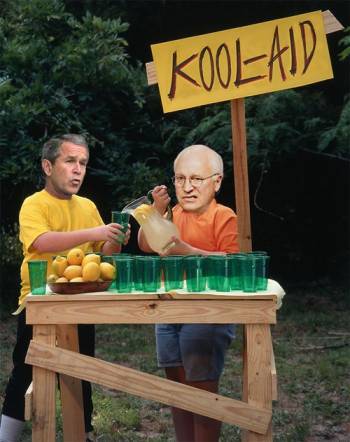Dick Cheney- Corporate Criminal |
|
 Details the myriad illegal, immoral, and unethical activities of Dick Cheney when CEO of Halliburton, his obstruction of justice, and lies to the American public since his appointment as Vice President.
For information on an equally corrupt politician, see link to Tom DeLay-Corporate Whore.
Be sure to visit our cavernous vault of archives.
Details the myriad illegal, immoral, and unethical activities of Dick Cheney when CEO of Halliburton, his obstruction of justice, and lies to the American public since his appointment as Vice President.
For information on an equally corrupt politician, see link to Tom DeLay-Corporate Whore.
Be sure to visit our cavernous vault of archives.Cost of the War in Iraq
(JavaScript Error)
|
 'Dark Side' sheds light on Cheney By Sam Allis, Globe Staff | June 20, 2006 "Frontline" delivers a devastating look tonight at the efforts of Vice President Dick Cheney to gain control of the war on terror after 9/11. In doing so, the show purports, he compromised the integrity of America's intelligence system. "The Dark Side" is riveting television, heavily reported, that exemplifies what "Frontline" does best: go inside a major story and give us context. The title is a ripe double-entendre that applies both to Cheney and the turf on which the war against terrorists is fought. "We have to work the dark side, if you will," we hear Cheney say. "Spend time in the shadows of the intelligence world." To many, Cheney is the dark side of the Bush administration, and this program will only cement that judgment. ``Frontline" chronicles the brutal campaign by two consummate political in-fighters -- Cheney and Secretary of Defense Donald Rumsfeld -- to decimate the CIA, politically emasculate Secretary of State Colin Powell, and construct a near-limitless concept of executive power during war. While many of these strands are familiar, they have not been assembled as effectively before on television to present a coherent picture of what happened after 9/11. Cheney didn't trust the CIA after it missed the collapse of the Soviet Union, the Iranian revolution, and Saddam Hussein's invasion of Kuwait, so he created through Rumsfeld's Pentagon his own intelligence network to suit his agenda. Powell and former CIA director George Tenet were no match for this pair, who have known each other for three decades. By the time that Cheney's chief of staff, Lewis ``Scooter" Libby, was indicted last fall, Powell and Tenet were long gone and the CIA was in shambles. Tenet leaves as a thoroughly compromised man who first opposes some of Cheney's intelligence conclusions and then caves. He receives from Bush the Medal of Freedom -- the highest honor the president can bestow -- as he is pushed out. ``You've seen this episode of `I, Claudius,' you know?" says Steve Coll of the New Yorker. ``You put the knife in one side and the medal on the other side and that's politics." ``The Dark Side" is, in a sense, CIA payback for its treatment. The program is dominated by legions of former CIA officers, some of whom left over the agency's treatment by the White House, and they detail what they view as Cheney's efforts to find the intelligence to fit the war he wanted against Saddam. Virtually no one, in contrast, appears from the Cheney-Rumsfeld camp to defend the two men's actions. The talking heads are excellent. Most of the ex-spooks are strong, as is David Kay, leader of the failed attempt to find weapons of mass destruction in Iraq. So are intelligence experts Ron Suskind and James Bamford and the inevitable Bob Woodward. ``Frontline" walks us through the bad intelligence that Cheney spouted in public, even after the CIA had challenged it, like an Al Qaeda -Saddam connection and Saddam's supposed purchase of enriched uranium from Niger. We hear that the president's first reaction to the WMD evidence was, ``Is that all we got?" We hear that Powell was not told the truth about the provenance of facts on which he based his disastrous speech at the United Nations, and that Cheney and Libby made 10 trips to the CIA -- unheard of by the White House -- to push analysts on data. Paul Pillar, a respected former CIA officer, was a principal author of a signal report on WMDs in Iraq that proved so wrong. ``The purpose was to strengthen the case for going to war with the American public," he says. ``Is it proper for the intelligence community to publish papers for that purpose? I don't think so, and I regret having had a role in it."
Comments:
|